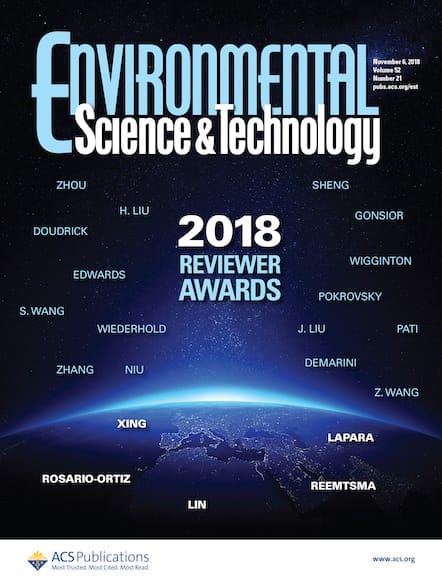Professor Jingyun Fang, Associate Professor in the School of Environmental Science and Engineering at Sun Yat-Sen University, is the recipient of the 2020 James J. Morgan Environmental Science & Technology Early Career Award. This award, named after the first Editor-in-Chief of Environmental Science & Technology, recognizes the contributions of early-career researchers who have led the […]


Professor Jingyun Fang, Associate Professor in the School of Environmental Science and Engineering at Sun Yat-Sen University, is the recipient of the 2020 James J. Morgan Environmental Science & Technology Early Career Award. This award, named after the first Editor-in-Chief of Environmental Science & Technology, recognizes the contributions of early-career researchers who have led the field in new directions through creative, new ideas consistent with Morgan’s early contributions in environmental chemistry.
Professor Fang received her bachelor and doctoral degrees from the Harbin Institute of Technology, China in 2003 and 2010, respectively. She took a postdoctoral fellowship at the Department of Civil and Environmental Engineering at the Hong Kong University of Science and Technology before joining Sun Yat-Sen University in 2013. Professor Fang’s research focuses on the aqueous chemistry of reactive species (particularly radicals and high-valent manganese) in natural and engineering systems
The 2020 James J. Morgan ES&T Early Career Award will be presented at the 2020 ACS Spring National Meeting in Philadelphia, where Professor Fang will give an invited talk.
I had an opportunity to conduct a short interview with Professor Fang to learn more about her work and what this award means to her.
What prompted you to study the field of Environmental Science and Engineering?
Actually, I think it’s destiny that prompted me to work in the field of Environmental Science and Engineering. I love a sentence by a Chinese philosopher, Lao Zi. In Chinese it is “上善若水,水利万物而不争.” The English translation is “The highest goodness is like water, water benefits all things and does not compete.” For me, it would be so good to be a person like water. When I was admitted by the Harbin Institute of Technology (HIT), I decided to study water and wastewater engineering. During my studies at HIT, I got acquainted with Professor Jun Ma, who later became my Ph.D. supervisor. After obtaining my Ph.D., I wanted to pursue topics different from my Ph.D. research. This thinking led me to get involved in free radicals and high-valent manganese in the water treatment processes. It is of tremendous interest to elucidate the roles of different free radicals and high-valent manganese species in water purification. Thus, it’s destiny and fortunate that I am studying in my current research field, which aims to solve current societal water problems globally.
What do you think are the major challenges still facing this field?
The major challenge in my chosen research area of aqueous environmental chemistry are to apply the remediation technology for effectively controlling pollutants in complicated environmental matrices for fundamental investigation and engineering application. Also, there is a lack of fundamental strategies, including theoretical calculations, to enhance the effectiveness of removing pollutants in aquatic environment.
What advice would you would give to upcoming researchers in the field?
I think interests and persistence are important for research. I like the saying by Isaac Asimov, “The most exciting phrase to hear in science, the one that heralds the new discoveries, is not ‘Eureka!’ (I found it) but ‘That’s funny… ‘” Being able to enjoy the research that you are doing and trying to involve something different into the research would make the research experience more interesting. I would emphasize to the researchers that working hard and being persistent will eventually fulfill your dreams.
What does it mean to you to be awarded the 2020 James J. Morgan ES&T Early Career Award?
I am greatly honored to be awarded the James J. Morgan Early Career Award. As a founding editor of the Environmental Science & Technology, James always maintained high standards and ethics of environmental science through fundamental approaches to environmental issues. I feel that I made a great strive in this direction to get this award. It is a coincidence that one of my latest research articles was on high-valent manganese. James researched on manganese element in aqueous environment in larger part of his research career and it is exciting to receive the award associated with his name.
